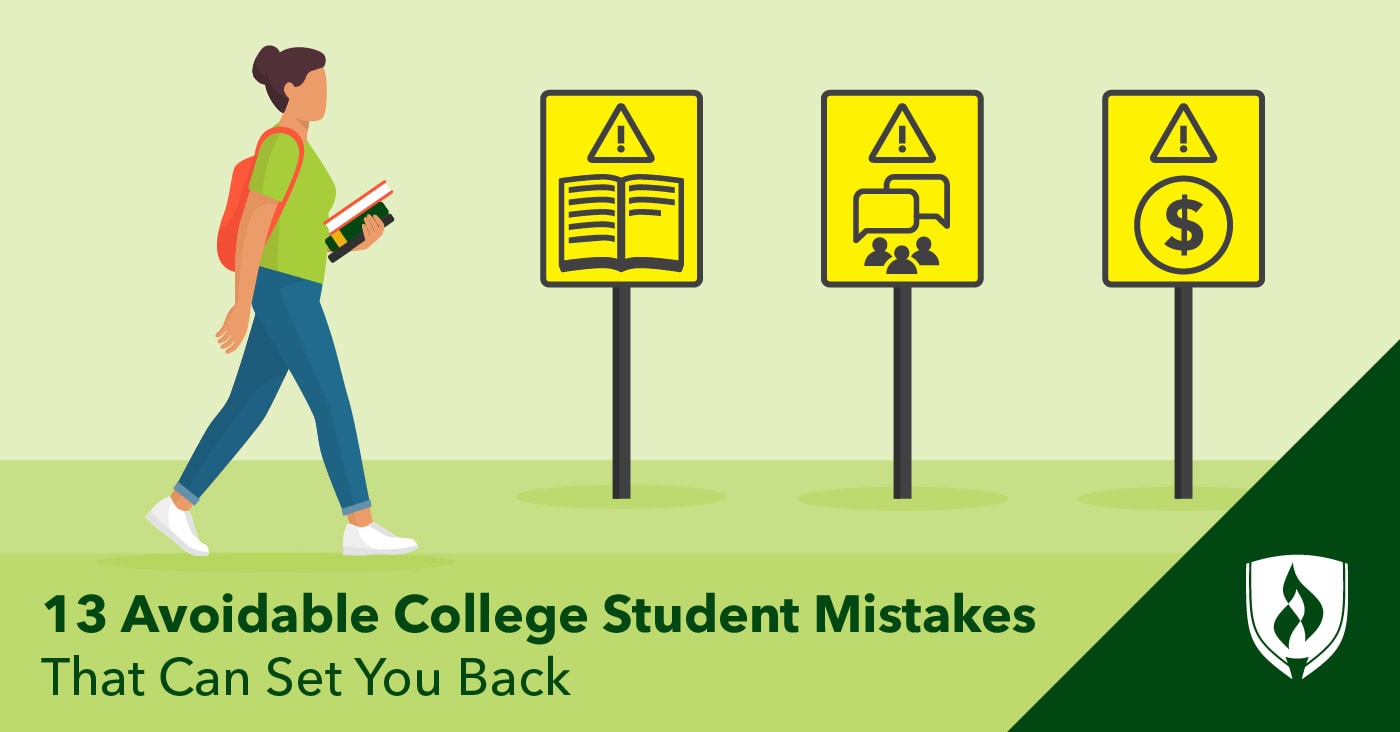
Getting started in college can be a stressful time, even for students with limited obligations outside of the classroom. Today, many college students are also balancing the important demands of jobs, family obligations and other responsibilities as they pursue higher education.
No matter the number of responsibilities on your plate, if you’re investing the time, effort and money into going to college, you’ll want to do everything you can to avoid the types of mistakes that can seriously set you back.
While you obviously can’t predict the future and plan ahead for the specific hurdles life may send your way, there are certainly ways to prepare yourself for the challenges people often face in college. We asked successful college graduates to share some of the avoidable mistakes they made while pursuing their education so you can steer clear. As the saying goes, hindsight is 20/20, so take advantage of someone else’s perspective to get a clearer vision of college student mistakes you should try to avoid.
Common academic mistakes college students make
Let’s start our round-up of potential pitfalls with academics—after all, that’s why you’re attending college in the first place!
1. Skipping the reading
While the advice to keep up with required reading might feel like the equivalent of being told by a parent to eat your vegetables, it really is an important factor for success. Most professors operate under the assumption students are keeping up with reading assignments and prepare lectures based on that foundational, shared knowledge.
“My biggest mistake was assuming I could get by just by attending lectures,” says international economic relations graduate, Velin Dragoev. He explains that lectures help you apply material and are not meant to replace the readings. While you may feel like you’re able to follow along with lectures only, often assignments and exams will directly reference these readings. That means in the long run, you’ll need to catch up with the work anyway.
“People who don’t realize that will find themselves in a lot of trouble during finals!”
2. Taking on way too much
It doesn’t pay to try to tackle too much at once. One of the biggest mistakes college students make is overloading their schedules, according to Jibran Qazi, business graduate and consultant for My Canada Payday. Quazi says he took on way too many classes and extracurricular activities, wound up sleeping two hours a day and lost his joy for college in the first year.
“Today I see a lot of college students pulling all-nighters every other week to cram for one quiz, exam or test and I shake my head,” Qazi says. Instead of burning yourself out, Qazi advises making yourself a sustainable study pattern and keeping to it.
3. Sticking to what you know
So much of college is about exploration! “If I could go back now, I would broaden my range of topics to study to fully understand my passions,” says Danny Browne, director at HARO Links.
He suggests starting with courses in a broad range of focus areas to help you see what you most enjoy. “Then, look to drill down your choices later on.” Browne’s experience was in a business program with many potential focus areas. He says it takes a little exploration to find out what works best for you.
4. Trying to work in a distracting environment
Distracting elements like the TV blaring in the background, kids asking you for something every three minutes and noisy roommates in your study environment can turn a simple project into a marathon of frustration.
“Dedicate a time and a place to revise that helps you get the most out of your work,” Browne says. He recommends tuning out your atmosphere with binaural beats playlists or other free “focus”-themed audio and visual resources that can help you zone in. Your work, writing and study efforts will be far more efficient if you minimize distractions.
5. Memorizing without understanding
A lot of education involves memorization, but if you want to get the most out of your college program, you need to understand the relevance, context and inner workings of a subject—not just the figures, names and dates. “Of course, you’ll need to know the definitions of commonly used phrases,” says business graduate and author, Simon Tam.
“Instead of trying to memorize the textbook, try to understand how the concepts are actualized in day-to-day life.” Not only is this more useful to you in the long run, but Tam says it will probably yield better test results as well. If you recognize how a concept works or is applied, you’re much less likely to be thrown off by a question or answer worded slightly differently than study materials.
6. Procrastinating until crunch time
Many college-level courses give students leeway with how they pace their coursework—and that freedom can sometimes be a trap for students used to the high school routine of almost-daily homework.
Just because it may be possible to coast and take it relatively easy for long stretches in certain courses doesn’t mean it’s a good idea. Dragoev says one of the biggest college student mistakes he saw involved saving big projects, assignments and other time-consuming work for the last week of the course. This approach can lead to an overwhelming to-do list that, even if completed, likely isn’t going to help you effectively retain information. “Isn’t the whole point of college to learn and acquire new skills?” Dragoev says.
7. Skipping sleep
Often the direct result of procrastination, skipping sleep and putting in long nights of coursework at the last minute are a recipe for trouble.
“Repeat after me: no all-nighters,” says Kate Kandefer, co-founder and CEO at SEOWind. She emphasizes that you are damaging your ability to think if you try to study or work through the night. While it might feel like getting ahead in the moment, you will most likely only set yourself back.
Financial mistakes to avoid as a college student
Beyond academics, there are also plenty of common financial mistakes college students tend to make—here’s what you can try to avoid.
8. Ignoring expenses
Being in a college program doesn’t mean the daily costs of life are put on hold. Even though you may have hopes for a better job or salary after graduation, it’s important to remember the budget you are working with now and be careful with spending. Dragoev says expenses related to life on campus can be a blind spot for students. If you lose track of how often you are eating out as you rush from place to place—or if you’ve moved to a different city for school—research the expenses most likely to add up and do your best to keep them minimized.
9. Not researching scholarship and financial aid options
“Often, students default to whatever is easiest,” Tam says. This often means spending a very small amount of time researching ways to make your education more affordable. Even if you can’t get a scholarship through your school, there are so many other options for finding scholarships and grants out there.
“Prioritize applying for scholarships, especially niche programs that focus on a particular passion, unique background or experience,” Tam advises. It can take some time and effort, but the opportunities are out there. Not every scholarship is going to be huge, but even a handful of smaller awards over the course of your education can have a substantial cumulative effect—particularly when you consider the cost of compounding interest on student loans.
10. Not setting a budget
College students have a lot of new experiences on their plate, and many have never had to really focus on their day-to-day finances—which can lead to some substantial issues. Taking the time to build a basic budget to track income and expenses is one of the easiest ways to address this. When you know roughly how much money you have coming in or out over a period, you can then figure out what you’re spending it on and when it’s time to cut back on less-important expenses.
“One of the biggest mistakes I’ve seen is students not budgeting daily,” Browne says. He advises checking your budget on at least a weekly basis to stay on track.
Networking mistakes college students make
One of the most important things you can gain from a college program is a network of peers and potential mentors. Avoid the following mistakes to get the most out of the people in your program.
11. Comparing yourself to others
Comparing yourself to other people is a huge mistake to make in—and after—college, according to Zach Blenkinsopp, owner of Digital Roofing Innovations. “College is a place to network and make social connections. You’ll meet different people who might be in a better place than you.”
When that happens, Blenkinsopp says it’s important not to feel belittled by other peoples’ success. Instead, reflect on how valuable it is to have such smart, well-off or thriving people in your social circle and treat them as a source of wisdom.
12. Skipping relationships
You might already have your hands full with the relationships you have, but the peers in your program are too good of a resource to leave untapped. “The biggest mistake I made when I first entered college was prioritizing grades over relationships,” Tam says. He encourages students to think of their fellow students as potential future colleagues. Your paths might not cross for a long time after graduating but leaving a good impression could help give you an in at a future employer or business partner down the road.
13. Trying not “bother” your professors
Your professors are busy folks, and maybe you aren’t the kind of person who likes to ask for help. But college students who cultivate connections with their instructors can find an incredible source of support.
“The biggest ingredient for my success was my relationships with a few key professors,” says Travis Vaughan, CEO of Cancun Tourbase. He points out that professors typically love seeing students who are energetic, curious and invested in what they’re teaching. “Most will go out of their way to hook you up with valuable resources, important introductions and even great business connections years after you have left the university.”
Get the most out of your time in college
With a better idea of these common college student mistakes, you’ll have a little more help navigating your education. Good college and university programs offer resources and support systems. Sometimes, students don’t know these resources exist—or don’t realize how much easier things can be when they take advantage of them.
These resources are there for your success, comfort and peace of mind, so why not take a look? Our article “12 Surprising Student Resources You Didn’t Know Rasmussen University Offered” highlights some of the helpful tools, resources and aides you’ll have at your disposal.




